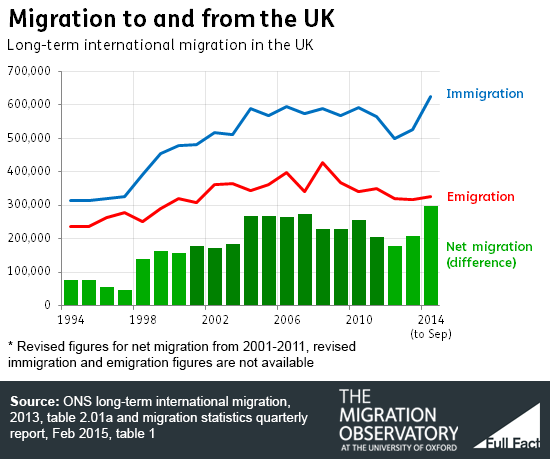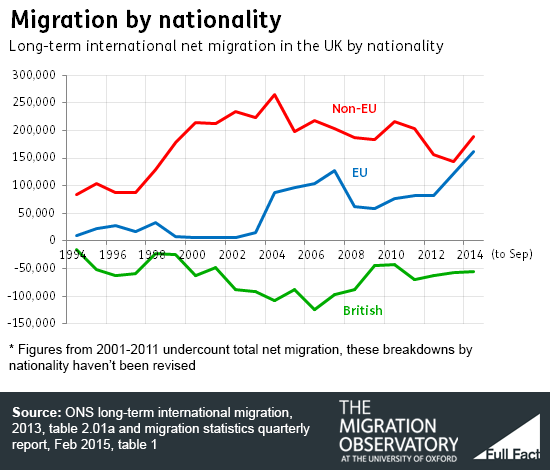Election 2015: Immigration
Immigration is seen as the most important single issue facing Britain today. Most people are opposed to immigration in general, although if you dig a bit deeper people are more in favour of certain categories of people—such as students and professionals—moving here.
Honesty in public debate matters
You can help us take action – and get our regular free email
Net migration
Immigration and emigration are hard to count precisely. About 100 million people enter the UK every year and about 100 million people leave. Most of them are coming in or out on holiday or for business. Immigration of around 624,000 and emigration of 327,000 are a tiny fraction of that.
Net migration—the difference between immigration and emigration—increased a lot in the late 1990s and since 2004 following EU enlargement and remains at historically high levels. It's been the main driver of UK population growth since the late 1990s, but in recent years has been less of a factor than births and deaths.
"Net migration is higher now than it was at the election"
Net migration is about 50,000 a year higher now than at the election, after falling to a recent low in 2012. That compares the year to September 2014 (the latest period for which figures are available) to the year to June 2010—the closest period leading up to the general election. EU immigration has driven most of the recent increases.
"The Conservatives have failed to meet their net migration targets"
During the 2010 General Election campaign, the Conservative Party pledged to bring 'net migration' down to the 'tens of thousands' by the end of Parliament in 2015. Net migration under the Coalition is now about 298,000 a year, three times the level implied by the target.
"The growth in EU immigration is to blame for failing to meet the target"
EU immigration is a factor but not the only one. EU immigration has been the main driver of growth in net migration since the election, compared to non-EU immigration. However even if EU net migration had remained at 2010 levels, the target could still have exceeded 200,000.
"Non-EU immigration is down by 13%"
This doesn't refer to the government's entire period in office. Immigration of non-EU nationals is down 13% from its peak in 2011, but since the time of the 2010 election it's down about 6%, which is well within the margin of error for these estimates. EU immigration meanwhile is up 43% since the election.
The claim has also been made referring to a 13% cut in non-EU net migration. Net migration of non-EU nationals has hardly changed since the last election, falling by 6,000 since the year ending June 2010, again well within the margin of error. It has fallen by 13% since the year ending September 2010, though it isn't clear why this would be used as the starting point of comparison.
"Labour predicted only 13,000 would come here from Eastern Europe but many more came"
Labour did publish a report in government predicting net migration of between 5,000 and 13,000 from 2004 to 2010, following enlargement of the EU. Net migration was at least 50,000 from the largest joining countries on average in reality, and was probably more than was estimated.
But the report was based on assuming that no other existing EU countries would enforce temporary restrictions on immigration from the new members. In reality most of them did so, and the UK was in a minority by not enforcing restrictions. So the report's main 'predictions' were already obsolete shortly after they were published.
The same report could be read as making a rough prediction of just under 50,000 net migration if accounting for the restrictions introduced by other countries, although this would still have understated the likely migration levels that took place.
Enforcing immigration
The government has the task of enforcing immigration both at the border and among people already in the UK who violate immigration law.
"The government has cracked down on bogus colleges and has closed 800"
836 education providers lost their licences between May 2010 and October 2014, preventing them from bringing students from outside the European Economic Area (EEC).
But this doesn't necessarily mean the government took away those licences and doesn't mean those institutions are no longer providing services.
Some did not apply for the 'highly trusted status' the government introduced, some who lost their licence have since had it reinstated, and not all of those who lost their licences will have closed (they can still serve UK or EEA students).
"The government has reintroduced exit checks"
The government introduced exit checks at ferry terminals and the Eurotunnel on 8 April this year, after checks at most airports had already been brought in over the last seven years.
However, the policy has been criticised for not being comprehensive—for instance not including routes to Ireland, private boats and flights, and coachloads of schoolchildren.
The process of reintroducing exit checks has been ongoing for the past decade, after paper-based checks were partially scrapped by the Conservatives in 1994 and fully by Labour in 1998.
Health tourism
'Deliberate' use of the NHS—use by those who come here specifically to receive free treatment or who come for other reasons but take advantage of the system when they're here—is hard to quantify. It's thought to cost very roughly between £110 million and £280 million a year.
'Normal' use of the NHS—by foreign visitors who've ended up being treated while in England—is estimated to cost about £1.8 billion a year.
"Health tourism costs £2 billion a year"
This isn't the cost of 'health tourism' but the estimated cost of treating foreign visitors who use the NHS, as well as those who come deliberately or take advantage of the system while they're here. Most of it — around £1.8 billion — is thought to be 'normal' use by foreign visitors who happen to need treatment while they're in this country. Between £110 and £280 million is thought to be 'deliberate' use.
Economic impacts
Measuring the economic impact of migrants on jobs, wages, welfare, public services and the public finances is difficult, and often rests on significant assumptions. Existing research tends to disagree, although there are some broad areas of agreement.
"Immigrants from the EU contribute more than they take away"
Research generally agrees that EU immigrants tend to contribute more than non-EU immigrants. And that immigrants who have arrived recently tend to contribute more than immigrants who've been living here longer term. But that doesn't mean each individual actually contributes more than they receive from the state. But putting numbers on this is hard, and there are a lot of alternative estimates.
"Immigrants take the jobs of British workers"
Research does not find a significant impact of overall immigration on unemployment in the UK, but the evidence suggests that immigration from outside the EU could have a negative impact on the employment of UK-born workers, especially during an economic downturn.
The impacts aren't fixed in time: they depend on the skills of migrants and the skills of existing workers.
"Immigrants drive down the wages of British workers"
Research suggests that immigration has a small impact on average wages of existing workers but more significant effects for certain groups: low-wage workers lose while medium and high-paid workers gain.
The wage effects of immigration are likely to be greatest for resident workers who are migrants themselves.
"Immigration is putting pressure on school places"
It's difficult to single out the impact of immigrants on school places. Births in the UK are a bigger factor than net migration, but some births are to migrants in the UK. 197,000 children were born to non-UK mothers in 2013, compared to an estimated 20,000-34,000 extra children under 15 immigrating to the UK.
While most births are still to UK-born mothers, the proportion of births to non-UK mothers has been rising in recent years, and non-UK born women tend to have more children.

